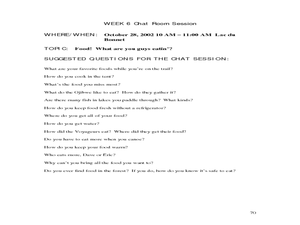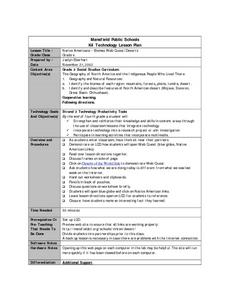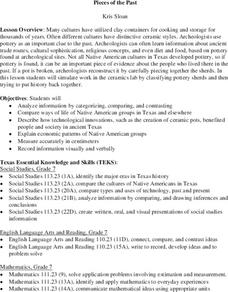Curated OER
Who are the Women of the Pacific North West: 1830-1870?
Students view a picture from the Vancouver National Historic Reserve and discuss the people in the picture. They locate Cromwell's Map and discuss the villages located close to Fort Vancouver. Students read information regarding the role...
Curated OER
This Land is My Land, That Land is Your Land!
Students explore the Native American migrant experience in the United States. They define and describe reservation and the relationship between the U.S. Government and Native tribes through individual textbook research and class discussion.
Curated OER
Joining Chief Pontiac?
In this Pontiac's Rebellion worksheet, pupils write speeches that require them to imagine they are American Indians deciding whether or not to join the rebellion.
Curated OER
Food: The Ojibwa and Voyageurs
Learners examine food eaten by the people of the Ojibwa and Voyageur tribes. In this healthy eating instructional activity, students analyze the food choices of those who lived here before us. Then, learners consider how our food choices...
Curated OER
Learning By Looking: Pueblo Indian Ceremonial Dances
Students investigate the uses of ceremonial dance in the Pueblo Indian culture by viewing videos of native dances. They listen to folk tales that explain the dances and compare the traditions of the Pueblo culture to their own culture....
Curated OER
Town Growth and Immigration
Fourth graders describe how Michigan has changed and stayed the same over time. They explain reasons why people settled/settle in Michigan, then explain the role of geography on the settlement of Michigan.
Curated OER
Systems of Power Against and Within American Indian Communities, 1880-1940
Young scholars explore methods and the struggles of power between the federal policies and Native populations. They discuss the issue of controlling the Native Indian population, driving them from their land, and providing a mandatory...
Race Briges Studio
I am Indopino: Or, How to Answer the Question, "Who Are You?"
In our increasingly multi-ethnic society, many students find it difficult to identify themselves as belonging to any one ethnicity. Gene Tagaban, a Tlingit, Cherokee, Filipino offers his personal experiences with these questions in his...
National Endowment for the Humanities
Hopi Place Names
What's in a name? Historians consider the question as they examine places important to the Hopi people and the meanings of their place names. Included worksheets include maps and charts to help class members examine the geography of Hopi...
Teaching Tolerance
Thanksgiving Mourning
Two primary sources, a speech, and an article provide tweens and teens with different perspectives of the American Thanksgiving holiday. After analyzing Wamsutta James' suppressed speech and Jacqueline Keeler's article, class members use...
Indian Land Tenure Foundation
Elders' Stories
Very young learners study the ways that oral traditions play such a huge part in the culture of Native Americans. They see how Elders pass along stories to the younger generations. If possible, a tribal Elder comes into the class to...
Global Oneness Project
The Importance of Indigenous Language Revitalization
Middle schoolers consider languages as representations of cultures and the importance of preserving various languages, especially the rapidly disappearing languages of indigenous peoples, in a lesson that tells the story of Marie Wilcox...
Curated OER
Mile in My Moccasins
Students explore the concept of philanthropy as it is related to the Native American culture. They research the history of different symbols used to find specific examples of philanthropy in Native American culture.
Curated OER
What Is In A Name?
Fourth graders investigate the meaning of names and how they are used to name geographic places. They conduct research using a variety of resources. Special attention is paid to names given within the Native American culture. Students...
Curated OER
Native Americans ~ Biomes Web Quest/deserts
Students identify the biomes of each region: mountains, forests, plains, tundra, desert. They identify and describe features of North American desert (Mojave, Sonoron, Great Basin. Chihuahaun). They identify what we are doing today is...
Curated OER
Images of the New World
Learners examine how visual and literary images played an important role in the English colonization of Virginia. They analyze the importance of Thomas Harriot's Report on the subsequent development of English colonial plans for...
Curated OER
Debunking the Myth of the American West
Students participate in a close reading. They examine the text closely for implied and hidden meaning, dissect the story to understand the text as a written craft, and discuss significant details and overall meaning of story. They...
Curated OER
Artwork of World Cultures
Seventh graders research a culture and art produced by the people of that culture. They create a PowerPoint presentation to explain their findings. Students make a sand painting depicting the art of that era.
Curated OER
Lewis and Clark: Great Journey West
Students view a movie about Lewis and Clark's expedition out west. They examine how Native Americans helped them on their journey. They choose a Native American to research and present their findings to the class.
Curated OER
Site Robbers
Fourth graders interview a Native American and write a newspaper article or letter that expresses concern about robbing archaeological sites.
Curated OER
Touch the Past: Archaeology of the Upper Mississippi River Region
Students examine the archeology of the Mississippi River Valley. Using the internet, they expand their research to include how the Native Americans in California used plants to meet their needs. They also research a Native American...
Curated OER
Ghost Canoe
Fourth graders are read the book "Ghost Canoe" by their teacher. Using a map, they locate the physical characteristics of Washington State and describe how people adapted to their environment before statehood. They discover how people...
Curated OER
Pieces of the Past
Seventh graders compare and contrast the way of life of Native Americans in Texas and around the country. As a class, they brainstorm about the uses of pottery today and use broken pieces of pottery to create an artifact. In groups,...
Curated OER
Caloric Expenditure in Powwow Dancing
Sixth graders investigate the meaning of different types of Native American music and dance. They determine how this music and dance has contributed to modern music and dance. They problem solve to determine the average length of the...

























